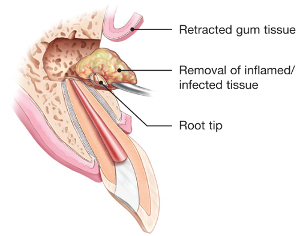An apical microsurgery procedure may be necessary in some cases in order to eliminate infection from the root tips of a patient’s teeth. This is made possible through removing the tip of the infected tooth, followed by cleaning the bone that surrounds it.
If the infection does not resolve and continues to fester in the bone surrounding a tooth despite having a previous root canal procedure, an apicoectomy surgery will then be required.

To begin the surgery, Dr. Danesh will first create a small cut into the gum tissue in order to gain access to the bone. After this, the end of the root tip along with the infected tissue are eliminated through the tiny incision created. To complete the surgery, a filling is be placed in the end of the root and the gum tissue is stitched up to help protect from re-infection.
Some patients may also require a bone graft in order to repair damaged bone. Through several months of recovery, the bone will heal around the root.
During the recovery phase of an apical microsurgery, the patient may experience feelings of discomfort or mild swelling. The good news is, this is nothing to be concerned about as this is expected with any surgical procedure.
Over-the-counter pain medications can be taken in order to manage discomfort in the meantime. If the pain is not responding to OTC medication, it’s important for you to please contact our office to let Dr. Danesh know.
To learn more about apical microsurgery, please contact our team at Elgin Mills Endodontic Specialists today.